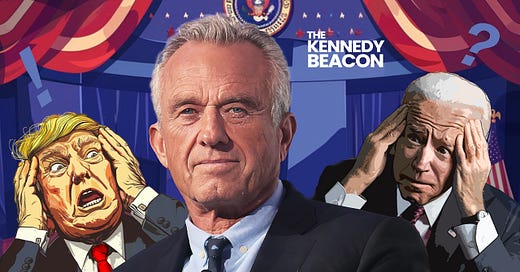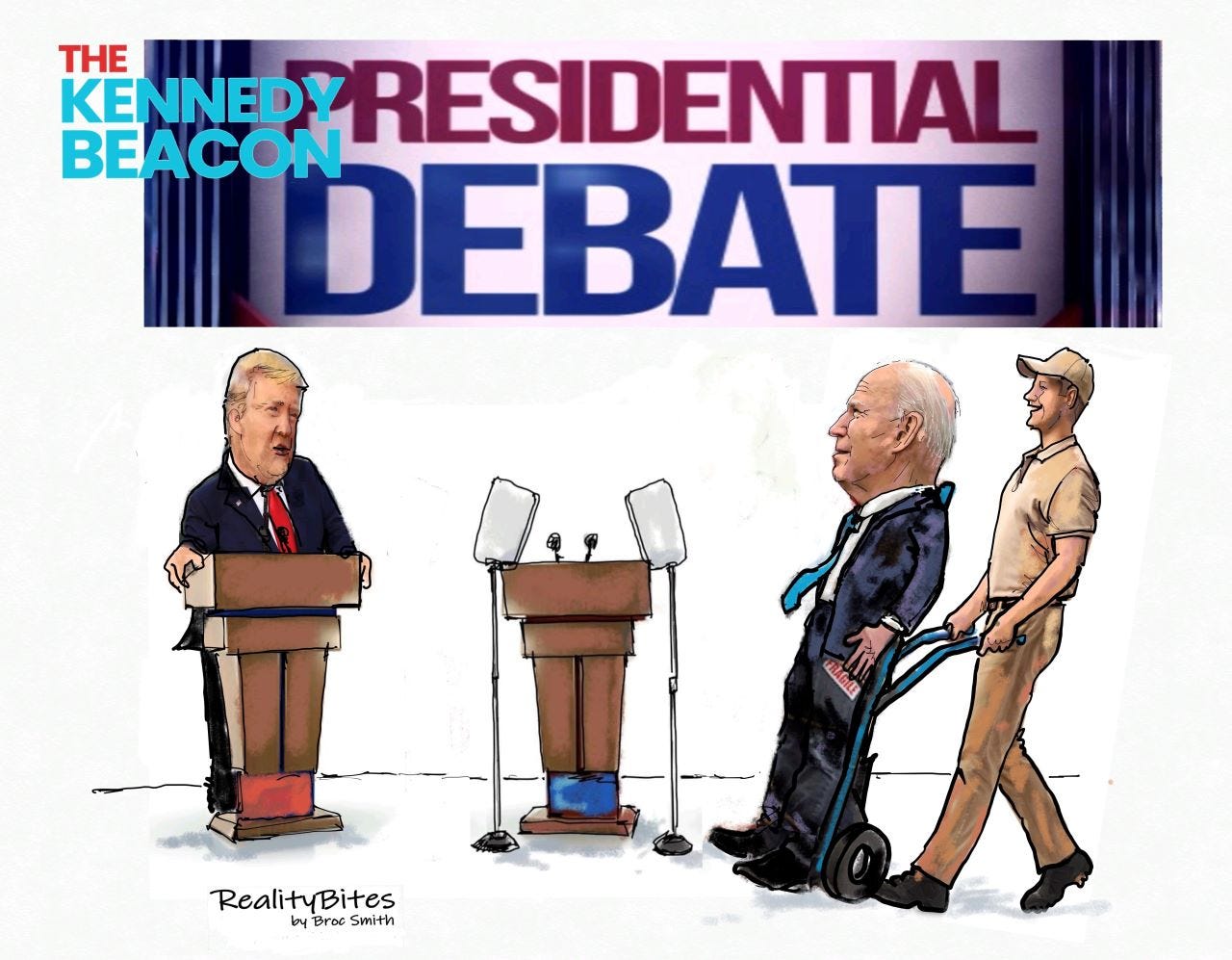By Adam Garrie, The Kennedy Beacon
Who’s afraid of Robert F. Kennedy Jr.? President Biden and former president Trump!
The current and former presidents have agreed to debate each other on June 27 in Atlanta, Georgia, hosted by CNN. But neither of them, nor CNN, has invited the independent candidate, Kennedy.
[People of every political background, who believe that Kennedy has a right to stand on the debate stage, are invited to sign a petition directed to CNN.]
Why Exclude Kennedy?
Kennedy’s exclusion comes despite some recent polls showing him meeting or exceeding the traditional 15% threshold for participation in debates. According to Zogby data from April, Kennedy would easily beat Biden in a head-to-head and he has a slight lead over Trump head-to-head, as reported in The Kennedy Beacon. The same poll shows Biden losing to Trump.
A representative of the Biden campaign told Axios Kennedy was not welcome, “Our criteria for a 1:1 debate was made clear publicly, it was made clear to CNN and they understood our position when we accepted their offer.” This makes a mockery of CNN’s own rules as it would appear that Biden’s main stipulation for participating in a debate is his being on stage with Trump and Trump alone.
Similarly, a Trump campaign official told the Washington Post that CNN had promised that Kennedy would not be on the debate stage. This give’s credence to Kennedy’s statement that Biden and Trump had colluded to keep him off of the stage –– although Trump subsequently told NBC he has no problem allowing Kennedy on the debate stage, if he qualifies.
Voters should also question who decides who gets to debate.
Prior to 1987, presidential debates were organized by the nonpartisan League of Women Voters. But in 1987, the new Commission on Presidential Debates (CPD) began to regulate debate access.
For the debate on June 27, CNN will exercise its own discretion in formulating the rules of the event. In a statement released shortly after Biden and Trump agreed to debate, CNN revealed:
To qualify for participation, candidates must fulfill the requirements outlined in Article II, Section 1 of the Constitution of the United States; file a Statement of Candidacy with the Federal Election Commission; a candidate’s name must appear on a sufficient number of state ballots to reach the 270 electoral vote threshold to win the presidency prior to the eligibility deadline; agree to accept the rules and format of the debate; and receive at least 15% in four separate national polls of registered or likely voters that meet CNN’s standards for reporting.
CNN further said that its polling window opened on March 13 and will close seven days prior to the debate – on June 20.
CNN later updated its debate press release with a list of the polls it will consider when determining which candidates qualify: CNN, ABC News, CBS News, Fox News, Marquette University Law School, Monmouth University, NBC News, The New York Times/Siena College, NPR/PBS NewsHour/Marist College, Quinnipiac University, the Wall Street Journal, and the Washington Post.
By listing polls based on their sponsor rather than by the company conducting the polls, CNN risks selecting polls based on the editorial confirmation bias of broadcasters rather than by looking at a diverse range of polls from respected polling agencies, irrespective of sponsorship.
In unbiased polls, Kennedy does get over 15%, as reported by the Beacon. His popularity increases as more voters become aware that he is running. Kennedy’s campaign director has further supplied a list of respected polls from recent months, two of which are in CNN’s list, two are not, that put Kennedy at or above the threshold for participation indicated by CNN.
Regarding the electoral vote threshold, Kennedy already has ballot access in some of the most difficult-to-access states with the most electoral votes (California and Texas) and his campaign anticipates being on the ballot in all 50 states by September, if not well before. So far Kennedy has gathered signatures in enough states to earn 201 electoral college votes. With five more state deadlines approaching, it is likely that Kennedy will reach the 270 threshold set by CNN in the week leading up to the debate.
Deadlines for filing for ballot access in most states are not until August, and there can be a strategic disadvantage to filing early in a state where the opposition can throw up legal obstacles. Scheduling the first debate so early in the election season appears designed to exclude Kennedy or to push him to file his ballot petitions prematurely.
Most states do not certify the candidates who will appear on the presidential ballot until September. In any case, neither Biden nor Trump can officially be placed on state ballots until after their respective conventions on August 19-22 and July 15-18.
CNN’s criteria, apparently designed to exclude Kennedy, is a major miscalculation and manipulation, since technically in late June, Kennedy will officially be on more ballots than Biden or Trump.
Kennedy remains optimistic.
I’m happy to report that I will meet the criteria to participate in the @CNN debate before the June 20 deadline. I look forward to holding Presidents Biden and Trump accountable for their records in Atlanta on June 27 to give Americans the debate they deserve.
Kennedy having enough signatures to qualify for a ballot should be equivalent to Biden or Trump being the presumptive nominee of their respective parties.
The co-chair of the CPD , Frank Fahrenkopf told Politico’s Playbook podcast that he believes Kennedy may have grounds to sue CNN over his exclusion. He added that officials in the Biden campaign were adamant that the CPD’s traditional roll should be sidestepped in favor of direct negotiations with the Trump campaign and major media companies.
Does Biden Actually Want to Debate?
Prior to May 15, Biden’s enthusiasm for debate wasn’t especially high. Suddenly, however, his cowboy-style debate challenge, “make my day, pal,” to Trump was met with almost immediate agreement from Trump, calling “Crooked Joe...the WORST debater.” Hours later, CNN had their formulation for debate participation criteria online and on air for all to see.
Democrats are reportedly worried that Biden may not have the cognitive stamina to carry the party to victory in November. Did Biden push for the unprecedented pre-convention debate – or was it the DNC, in order to gauge Biden’s performance on a national stage.
If Biden performs poorly against an energetic Trump, this would give fuel to the Democrat factions that seek to nominate someone other than the sitting president at the party’s convention in August. Such an outcome is a legal possibility, even though the move would cheat voters who were led to think their votes in the primaries mattered.
What Do People Want?
Kennedy’s exclusion also raises questions about Biden’s and Trump’s ability to engage with a candidate who is running a campaign based on issues rather than personal vitriol and vendetta, two characteristics commonly associated with the negative campaigning of the Republican and Democratic presumptive nominees.
With Kennedy on the debate stage, both Biden and Trump would be forced to confront issues ranging from inflation and housing to public health, the war in Ukraine, and the border. Without Kennedy, the debate risks disintegrating into personal attacks that the public has heard many times before.
Adam Garrie is a writer, speaker, and consultant on a wide range of current affairs as well as political risk. He is also the cofounder of HiCyrus, a data-driven tech startup that aims to fully democratize information access








